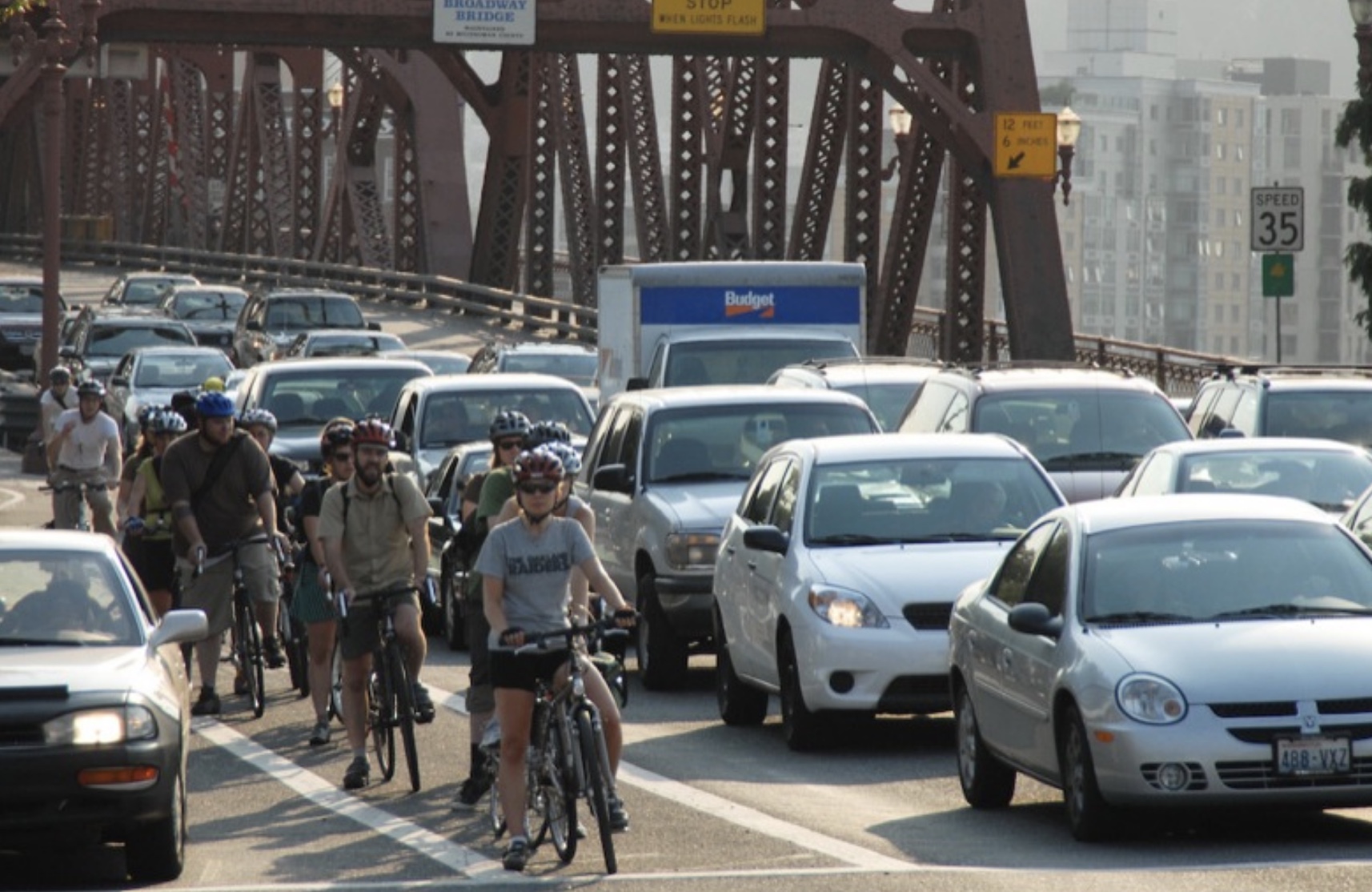
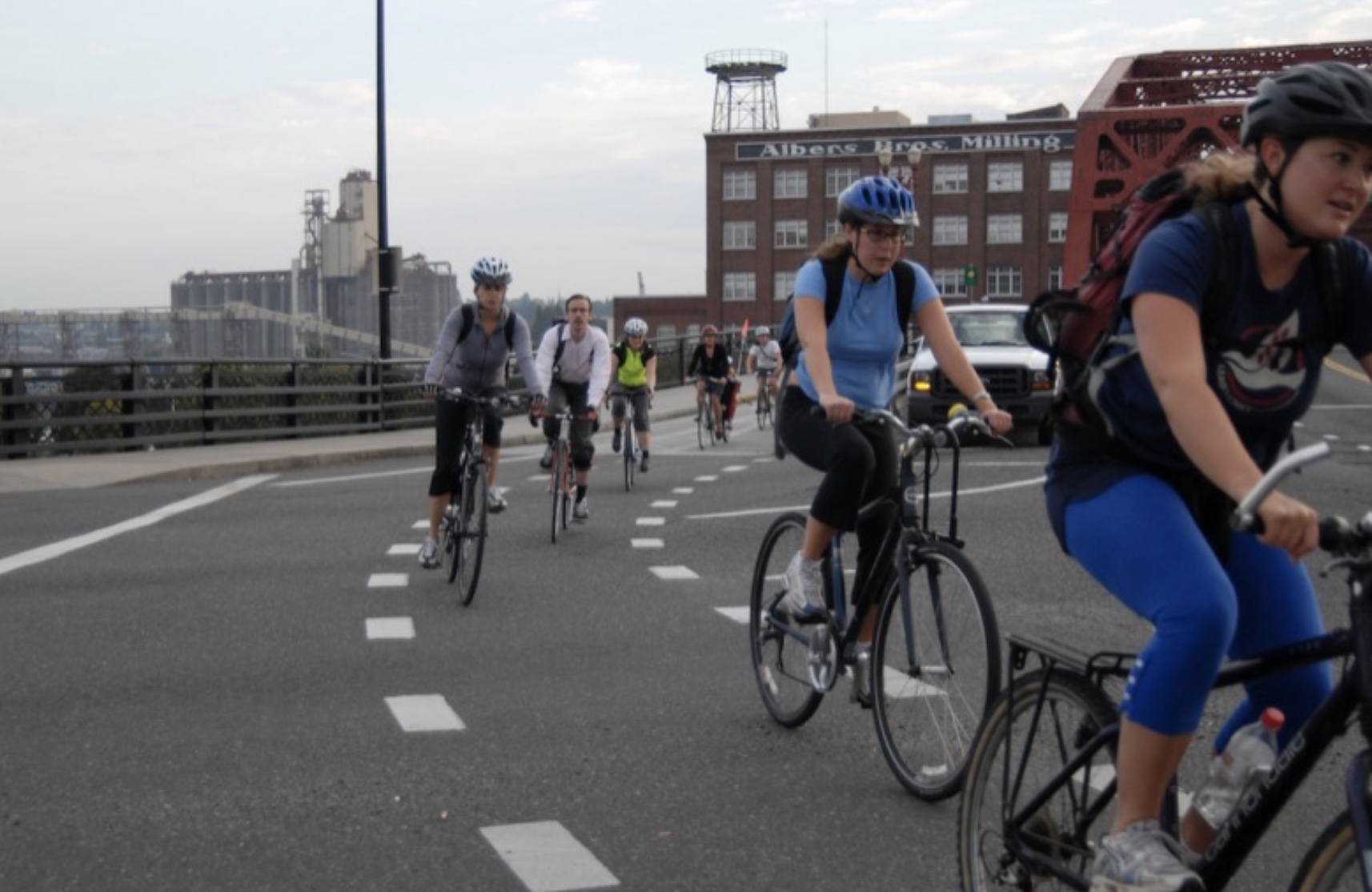

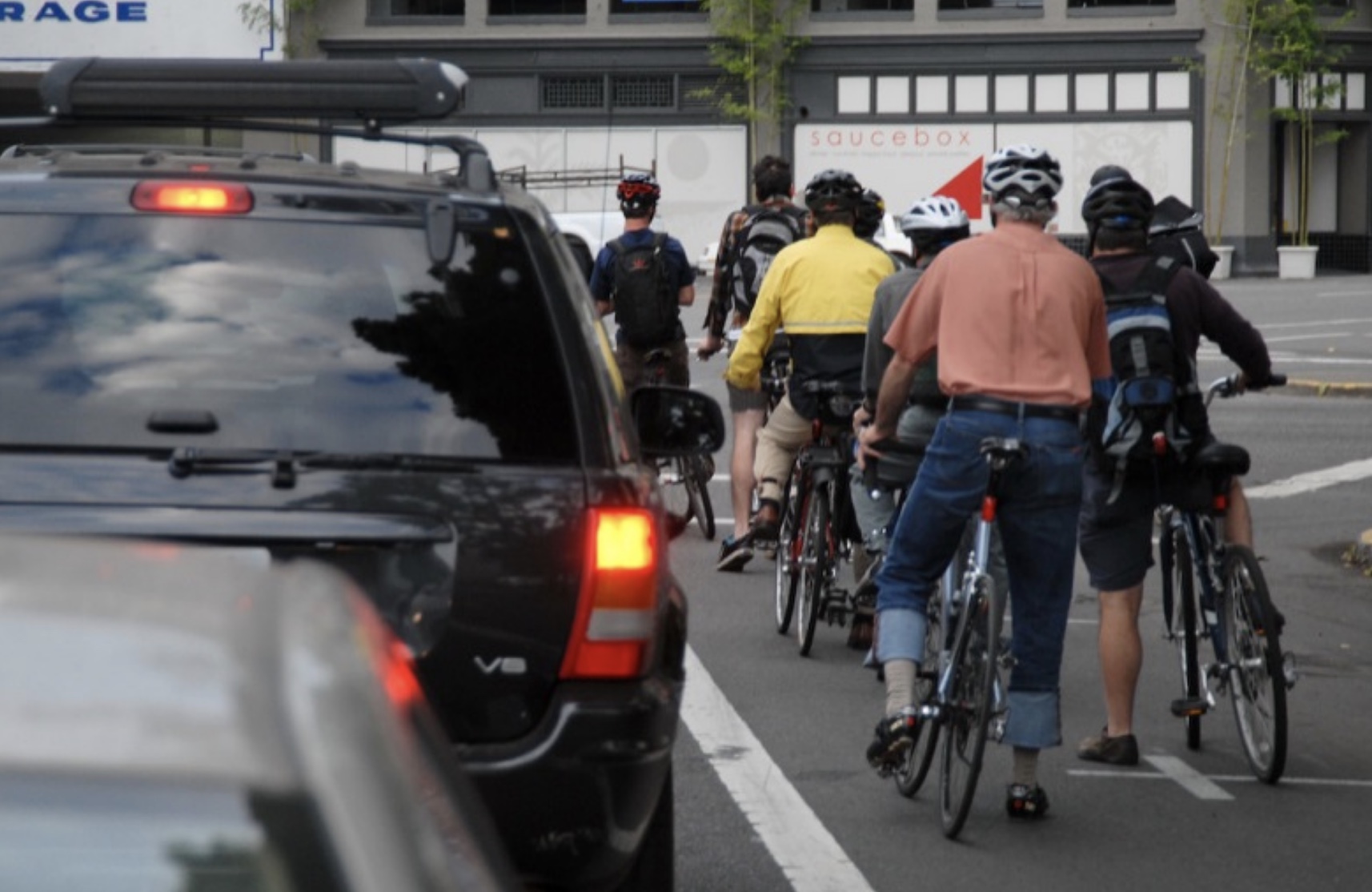
Gas prices have shot past $4 a gallon and I’ve started to wonder if sticker shock at the pump will lead to less driving and more bike riding.
The last time gas prices spiked in Portland, we saw a big shift in bike traffic volumes (see chart at right). In late 2007-early 2008, the price of gas was a big deal. Experts said it happened for a mix of reasons including strong demand coupled with decreased production.
The result in Portland was a lot more cycling. It was even a cultural phenomenon. The owner of River City Bicycles, Dave Guettler, was so excited about the added cost of driving that he took out an ad in the local paper (below) to publicize a contest wherein they’d give away a free bike to the first person to guess the date when a gallon of gas would hit $4.00.
Two months after River City’s contest, gas in the Portland area hit an all-time that still stands: $4.28 a gallon.
As you can see in these photos, our streets became much healthier and more humane citywide as people hopped on bikes to save a few bucks.
Unfortunately for our city and planet, the high gas prices were very short-lived. A few months later gas was very cheap. On the bright side, we reported an optimistic view that many people would keep riding.
Today, due to Russia’s war on Ukraine, we see another gas price spike. According to AAA, gas has just ticked over the $4.00 per gallon mark in the Portland area. Coupled with the Covid-era bike boom, the red-hot climate crisis looming over us, and very uncertain global politics, one might expect another big rise in biking.
But for all the factors that might lead to more people biking in 2022, there are just as many reasons cycling rates will remain flat unless we change course. We cannot ignore how the underlying conditions that led to more biking in Portland in 2008 simply don’t exist today.
Portland was a vastly different place in 2008, especially when it comes to transportation.
According to U.S. Census data compiled by the City of Portland (in chart above), the overwhelming majority of new commuters added to our streets (the white line) between 2008 and 2018 hopped into a car (black line) while the number of bicycle riders (blue line) was relatively flat. During Portland’s cycling boom (from about 2000 to 2014), bike riders were able to absorb an impressive amount of new commuters overall. But in 2015 that black line (a fitting color to represent driving if there ever was one) ticked up.
The most popular narrative for why drivers and their cars took over inner Portland neighborhoods in the past seven years at the expense of other modes revolves around the cost of living. We had a dramatic rise in housing prices which forced a pedaling-friendly population further away from their jobs and destinations coupled with different behaviors of tens of thousands of new residents who moved here from places where cycling was only an afterthought. In other words, the people most likely to bike increasingly lived in places where it felt most unsafe and inconvenient to do so.
So what about the new residents who moved into those close-in areas with the best bike infrastructure? Places that had historically seen strong double-digit cycling rates?
If you look at just the numbers, Portland has added an impressive amount of bikeway miles to the network since 2008. A PBOT tally that combines mileage of neighborhood greenways, buffered/protected/painted lanes, and carfree paths, says we’ve added well over 120 miles of new bike infrastructure to our system in the past 14 years (and we hadn’t even started building protected bike lanes in 2008). Portland bike infrastructure has improved a lot since 2008.
But all the bike infrastructure in the world is meaningless if the number of cars overwhelms it.
Portland’s famous cycling neighborhoods in inner northeast and southeast built their reputation on shared roadways, what we used to call “bicycle boulevards” that are now known as neighborhood greenways. Because we failed to inspire new Portland commuters to hop on bikes and transit as our population and housing density skyrocketed, they filled up these once “low-stress, family-friendly” streets with their cars. This led to lots of cut-through traffic and related issues (like the bad driver behavior in the Tweet above and tightly-parked streets with terrible intersection visibility) that have discouraged cycling and initiated a negative feedback loop.
At a meeting of the Portland Bicycle Advisory Committee in February 2020, longtime PBOT Bicycle Coordinator Roger Geller said, “My thoughts are and my experience is that conditions for biking on these inner streets are deteriorating and that is having a deterrent effect.”
“As much as we complain about congestion, it’s still really easy to drive a car in this city,” he continued.
Not only is it too easy to drive, Geller said, but bike infrastructure that’s too reliant on backstreets is also too easy to miss from behind the wheel of a car.
“If there was a big, fat, green bike lane next them as they were driving with a lot of people biking on it, they might say, ‘Oh, I can see the way to bike. Instead of driving, I just get on my bike and bike these streets’,” Geller said.
Geller understands Portland’s bike network than any other human on the planet. In his mind, our network has simply been too shy. People who might like to meet it and start a more long-term relationship with it, are never even introduced.
Here’s more from Geller:
“The neighborhood greenway network is rather hidden, especially to people who are new to town. You have to know where this network is, you need a map to find it. If you live on Stark, you don’t know that three blocks north is Ankeny Street and that it’s a really great neighborhood greenway. So I think we suffer a little bit from the fact that the network is hidden.”
Even beyond the “hidden network” problem Geller identifies, much of the bike infrastructure we’ve built since 2008 is not good enough to entice a broad spectrum of Portlanders to use it. And even where the design is good, the lack of maintenance and connectivity means that far too much our bike infrastructure is safe and useful to only a small slice of hardcore riders.
But there’s reason for hope. The gas price spike of 2022 is just one reason why I think political and social conditions are ripe to turn our biking gloom into another biking boom.
In 2013, just one year before we hit 7.2% — which was the highest cycling commute mode share ever recorded for a top 25 U.S. city — we looked back at what led to Portland’s bike boom and teased out five factors that led to it.
We wrote that cycling had succeeded in Portland because of the presence of five things: our “bike fun” culture (think Pedalpalooza and so on), excellent and inspired city staff, mature communication channels, committed activists, and a positive cycling feedback loop.
Do we still have those things? I think we score about 2.5 out of 5 on that scale, but I’ll save my rationale about that for a different day.
What do you think? Will high gas prices lead to more cycling? Would a boom even look the same given the big drop in commuters due to more working-from-home? What will it take for bicycling to make a comeback in Portland?



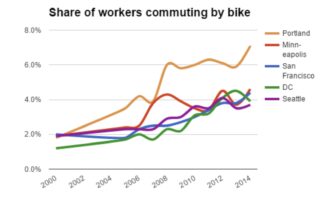


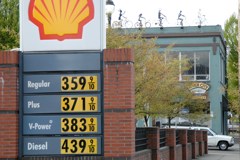
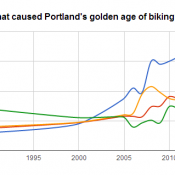
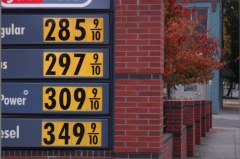
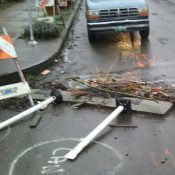
Thanks for reading.
BikePortland has served this community with independent community journalism since 2005. We rely on subscriptions from readers like you to survive. Your financial support is vital in keeping this valuable resource alive and well.
Please subscribe today to strengthen and expand our work.
Since the pandemic started, I’ve been working from home. I miss the daily endorphins of the bike commute and expect the easing of restrictions to enable as many if not more, bike commuters as the gas prices. Still the crime and squalor need to be addressed before downtown becomes a desirable biking destination.
Dear Granpa, please feel free to still cycle…but how about cycling over to Vancouver’s downtown…you will get the workout, great views and a whole lot less plywood and “crime and squalor” that you write about…that is once you pass thru the “Delta Park Vortex”…
Yeah Todd
Good on your for the civic boosterism. I wish I could be as proud of Portland right now. Vancouver has made great strides in their downtown and waterfront. Washington is still a sprawl factory but the north bank Columbia waterfront from I-5 to I-205 is a nice ride and Vancouver Lake Park and Frenchman’s Bar (and beyond) are super fine!
I’ve been working downtown over near Naito and Market and its been pretty quiet and clean over the past 9 months. No problems at all, and I’ve been there 9 hours a day, 5 days a week. I just wish they’d open the new bike lanes up as they’ve sat mostly finished for a few months now and still the barriers are up. What gives there?
The really smelly green coating is down but striping and surface signage are incomplete so probably the contractor hasn’t released it.
Cars overwhelm the streets and camps overwhelm the bike paths. $4+ for gas feels like a small price to pay to avoid confrontations after dark on my formerly pleasant Springwater commute.
I’d happily bike more places but having to deal with dangerous drivers and busy streets makes it a no-go for my wife who otherwise enjoys biking.
You shouldn’t have to be brave to ride a bike, it should be easy and low stress if the city actually wants people to bike.
A spike in cycling? I’ll believe it when I see it. I believe the golden days of bicycling in Portland, when the future looked bright, are gone, perhaps for good.
To be clear, I think our infrastructure is better than it’s ever been, and I still enjoy riding (though not on trails, and, increasingly wary about lawless drivers, I’m walking more and riding less). Cycling is no longer “in the air”, and I just don’t think that many folks want to join me.
I think it will take new leadership at PBOT and support from City Council to change that, and while PBOT will almost certainly swap hands this year, none of the potential replacements look like the avid cycling advocates we need to improve cycling’s outlook.
Good habits are hard to establish, and the combination of covid and Portland’s civic disintegration, along with an influx of new residents and their autos, have destroyed decades of hard work around getting people out of their cars.
I think gas needs to hit $7/gal for a few to think about cycling. It won’t be a big uptick though. Households make more money than they did in 2008, some new cars are more fuel efficient, and cycling just isn’t as fun as it was in 2008.
Yeah, whenever anyone complains about $3 and $4 per US gallon of ‘gogo juice’, I think back to the oil shocks of the late 70s/ early 80s when I started buying gas for our tractor and then driving and the ~$2.64 gal average in 1981 is like $8.50 gal…
I was going to say the same. $4 per gallon in gas over the $3 of say a year or so ago is likely around $600 per year in additional gas costs for the average (12,000 miles per year driven at 20mpg) driver. That is hardly something that most folks will notice and change behavior over.
I bought an electric car so my family is now 100% insulated from gas prices for commuting.
Sadly, we no longer can bicycle to work as we moved out of town and are commuters now. Its really hard to bike commute when you have to drop your kid off in one part of town and then work in the opposite side, although hopefully next year I can get back in the saddle. I hate driving!
Apologies for being nosy but did you move out of Portland, in part, because you could not afford housing for your family?
Personally, I stopped cycling to a lot of places I formerly did, such as theaters, grocery store and restaurants, when worrying about if my bike was going to be there when I left was worse than the guilt I felt for driving. Until bicycles are not “currency”, I don’t see cycling rebounding to anywhere near those 20teen numbers.
Riding to meet friends in inner NE used to be something to look forward to. Last time though I opted for the cage because of the risk of theft + vandalism to my bike and the small but real chance of encountering a person in crisis on a dark, lonely path with no escape routes. Bad drivers feel less unsafe than unprovoked assault.
I have nothing to back this up so feel free to go ahead and blow holes in it I guess; the problem is not that the greenway system is too shy and transplants can’t find it. The problem is transplants don’t care about the greenway system. It seems, to me anyway, that the people that move to Portland now are generally not the same type of people that moved here in the 90s and early 00s. The Portlandia vibe is largely dead. The bohemian vibe is largely dead. I don’t think that’s a stretch to say that. Look around! Look at Redfin to see what houses go for now. Do you know anyone that has left Portland for a cheaper city? I do! If you didn’t bike in the Bay Area, LA, SD, Phoenix, Vegas, anywhere in Texas, why would you get here, look outside at the rain and think, “I’ve got this car I’m *incredibly* accustomed to driving, but nah, I’m gonna dust off this (probably) P.O.S. bike and ride it around instead. Just because Portland.”? I’m sure there’s some folks that moved here in the last handful of years that bike. Of course. But I’d guess there are more folks that moved here that don’t give a shit about bike commuting and never will. Right??
On a positive note, I really hope downtown rebounds. I miss biking over the bridges, in or out, and riding with other cyclists. I miss going down there and having it feel so alive and fun. I don’t work in downtown but have off and on since the 90s. I went to PSU. In high school we’d skip school and take the #5 bus from Vancouver and go to Ozone and Django’s and act like delinquents. I really love downtown Portland.
So many people who biked for transportation have been priced out of inner Portland due to rampant housing speculation and gentrification.
And what is it that many “urbanist” cycling aficionados advocate for: even more “market rate” housing speculation.
[Stick figure riding a bike inserts stick in wheel]
It’s more than housing; I’m also hearing a lot of folks who are still here have stopped or reduced their cycling, in large part because we’ve stopped traffic enforcement.
An ironic outcome of “defunding”* is people moving from bikes to cars.
Sad.
*I know we didn’t defund, exactly, just stopped enforcing, but the impact is the same.
The numbers in the ‘change in number of commuters’ graph don’t balance. The sum of difference between 2017 and 2018 for individual modes is 9,676. The difference for total commuters is 9,187. If this presentation is used to support decisions, that’s important.
If you want to compare the value of a $4.28 Commodity in 2008 there are four choices. In 2020 the relative:
real price of that commodity is $5.14
real value in consumption of that commodity is $5.20
labor value of that commodity is $5.88 (using the unskilled wage) or $5.38 (using production worker compensation)
income value of that commodity is $5.58
economic share of that commodity is $6.05
https://www.measuringworth.com/calculators/uscompare/relativevalue.php
There has been about 7% inflation and some economic growth since 2020, the last year of complete data in this calculator, so we would need to see gas prices over $5.50 to match the real price of $4.28 in 2008, and of over $6.00 a gallon to reach the same impact compared to current average incomes.
$4.00 a gallon now is like $3.10 to $2.90 gas in 2008.
Proposal: My long time thinking – is that large states (or the feds) should peg their fuel tax to a set goal…and in times of cheap fuel these ‘extra funds’ would going into the dedicated transportation bank (O&M, etc.) for rainy days when fuel prices were inflationary (and stressing folks and adding pressor to reduce fuel taxes)…this would help communities and businesses flatten out the roller coaster of fuel shocks, as I assume we will start having them again. This policy once adopted may have geographic tiers…a lower price tier for rural areas (without transit) and border areas next to a “low tax” state or First Nations reservation/ casino.
Whenever I see this chart…I wonder if its authors controlled for an artificial policy impact: TRIMET removed its ‘fare free zone’ in the CDB…so this would help bump up the counts unless they controlled for such. Any transpo wonks out there that may have looked into this?
So long as cars and other monstrosities fill our sacred shared spaces with noise and exhaust folks who are not “hardcore” will not enjoy being on a bike (or on foot or wheelchair). Beside the obvious need for a connected, convenient and safe bike network, we need beautiful and welcoming spaces. Unless gas hits $8/gallon we won’t see a meaningful mode shift without meaningful changes to our built environment.
Can I just say that embedded video makes me feel sad? Certainly because of the terrible behavior of the person driving but also because it feels meanspirited in both directions. We don’t need to take pleasure in others’ misfortune (like that flat tire) even if it is deserved. I readily confess that when I am on my bike I sometimes fall into a meanspiritedness too, towards unthinking driving and drivers. That exchange is another example that we are living in an empathy desert that is harming each of us, and it reminds me I have work to do. Thanks for sharing, Jonathan and Tony.
The driver was trying to intimidate the guy on the bike. He’s clearly a real piece of work and the flat was well deserved, imo. There isn’t much we can do about these people and if laughing at an idiot helps cope, I don’t see the harm.
I agree with Rob’s take. Deserved or not, it did feel like a fight was picked where none was needed. Is the world really a better place because a cyclist blocked a driver trying to do illegally pass a diverter? Is it good that random people feel they can/should enforce the law against other random people? Do you think that interaction triggered some introspection from the driver that will inspire better behavior in the future?
It mostly felt like two bros thumping their chests.
I don’t see it. Portland is (still) a mess, crime is out of control, WFH, zero policing of traffic laws.
I’m over it and the pathological attitude of enablement rampant here.
What do you see Phillips? Is there anything you can say or do to make things better? This platform can help inform and inspire, but only if commenters like you leave informative and inspiring comments.
I appreciate your ardor, Johnathan but there’s a time and a place for inspiration and one for and honest and frank assessment of a situation. I’m not a policy or government expert. I don’t pretend my ideas of how to fix things are possible or even something worthy broadcast here as many others have attempted to persuade city council similarly to no avail. But that’s not the point. Point is i am fed up with excuses and happy talk.
In direct response to your comment, I don’t think bright-siding the serious and grave issues we face as a city is beneficial to anyone but momentarily for the commenter whose false sense of compassion and moral superiority are indulged. Indeed, I believe it’s this relentless focus on positive thinking which has caused the crisis to deepen.
I realize this is your venue and I take your comment as a gentle suggestion my input is no longer welcome here. Best of luck and thank you for creating this platform.
The main issue for me is the lack of traffic enforcement on the roads. It has made cycling very scary. And I’ve been a hardcore bike commuter for over 10 years. And I am now scared to ride. Drivers know and act like there are no consequences for their dangerous behavior. Cars speeding, drivers regularly blowing stops and full-on running red lights is common now in Portland. Many cars don’t even have licenses plates. If it scares me, how are we going get new people to ride? We need traffic enforcement. Like now. It’s just not safe out there. People want to feel safe about riding, and right now they don’t.
In 30 years of riding bikes in Portland it’s always been true that every intersection, driveway, and blind spot was a place where a bike rider made a decision that kept them alive, as well as saving the occasional pedestrian from harm.
That hasn’t changed. I’m always schooling myself to sit up and look in the blind spot, look up the one way street, listen for tires, judge whether the angle of the sounds behind me is opening or closing, and make odds on the intention of a driver behind a stop sign to make a stop/down shift to second/complete a sweep of their visual field/focus at less than 80 feet… it’s a jungle folks, always was. (I would never ever bike with ear phones, any more than I would jump out of a plane with my new Rosary).
I guess Portland is less welcoming to newcomers with bikes. We’re sort of frogs in the proverbial pot. There’s less space, fewer bike riders showing the flag, and likely more people who just began driving cars here lately.
What I would like from PBOT is to put less effort into incrementally putting little bits of stuff here and there. Instead lay out long, continuous, superior bikeways across the city. Link SW with its hills and windy streets to the Numbers the E side. Link Capital Hill to St Johns. Link Cully to Lents. Raleigh Hills to Skyline.
People can find their way around surface streets to get to local destinations. What we need is a leap of imagination on the (relative) scale of the Interstate Highway program to free people from the ruts of conflicted local streets so they can really move around the city.
I’ve been a critic of greenways. Suffice to say that my three memorable chances to die or get maimed, since Jan. 1, 2022, were all on NE Going St. Riding there is no better or safer than on Skidmore a few blocks South, and the pavement is actually worse. PBOT keeps dating greenways, like a friend dating a lovable liar, so my current hope is that ebike adopters put up enough demand that the city has to provide bike routes that really cannot be said to suck in any way.
I think a part of the problem is that a lot of people driving into Portland from the suburbs are just not used to doing anything but driving to get anywhere. No city in the metro area–certainly not Beaverton, where I live–has good bicycle infrastructure. Protected cycling lanes are non-existent, and arterials slice through downtowns with too-long light cycles that encourage speeding and red light running, functioning more like rural highways than town-center streets. Metro needs to command some authority on areas outside the city about how poorly they’re doing on these types of problems.
Combine this systemic regional failing with the social issues that exist everywhere and are concentrated in Portland, and it’s no wonder people are mostly driving everywhere. I will continue to walk and/or take transit for anything into or around the metro area, but I can certainly empathize with people who don’t and won’t.
From where I live (117th and Center ish) to 5th avenue (for mostly comfortable run east to Western) requires crossing 2 nasty intersections with god-awful light cycles (Lombard & Bvtn Hillsdale, 117th & Canyon). Since the shortest route from my current workplace home in the afternoon runs up 5th to Lombard then north, I have had to cross those intersections at rush hour far too often. I find riding to Goose Hollow then MAX’ing over the hill to be less stressful.
On days where I want the workout and have extra time (not often 🙁 ) I can opt to just ride over the hill from Goose Hollow and come in from the north though.
But there are many places *in* Beaverton that are not readily accessible by bike from my place – ironically The Bike Gallery being one of them. Getting to New Seasons requires taking the lane at the end of Center then taking the lane up Hall – not for the faint of heart.
It’s not just the routes, it’s also the destinations. With more people buying expensive e-bikes that come with hard wired lights and amenities, people need to feel secure about parking their bikes just like they do with cars. I would never park mine outside and out of view because I wouldn’t be able to replace it and wouldn’t want the hassle of replacing a clipped off light. I’d gladly pay $5 to store it with a valet in a fenced off parking lot.
I agree, Matt. Worrying about the safety of my parked bike keeps me from riding my bike to a lot of destinations. What would it take for businesses to establish valet bike parking? – or have a valet location downtown every couple of blocks? If I could buy a membership and always be able to count on secure bike parking, I would bike more often. But I’m guessing it hasn’t happened b/c the economics don’t pencil out. The gov’t would need to subsidize such ventures.
This follows the same regressive logic as “tolling roads reduces traffic” – sure, that might be the outcome, but it’s because people are becoming financially captive to alternate commuting rather than the choosing to do it. Unless you are singularly focused on getting less people to drive, rather than looking at the problem holistically, this shouldn’t be seen as a positive thing.
That being said, we really do need to be driving less collectively. A lot of it comes down to habits and personal patterns – many people who now live here moved from places that are wholly car dependent. From cradle to grave in a car. It is hard to undo those patterns, but it is possible, and quite frankly we’d all be happier and healthier for it. But we can’t accomplish it through shaming or squeezing people so much financially they are forced to do it.
For all the blame pointed to the influx in driving population, this is still, by American standards (low bar I know lol) an excellent city to bike in. Bike advocates are doing a huge disservice to a broader biking movement by emphasizing over and over how dangerous it is to bike here. Because, let’s be real, for the most part it isn’t if you live anywhere west of 82nd. Death of course can happen (as with any mode of travel) but to prop it front and center is a trauma response and not based in rational thinking, which would acknowledge that while there is risk, it is an anomaly. What ends up happening, by overblowing this potential risk of death and injury, is that you get less people on the roads biking, which creates a vicious death spiral – less people biking, less investment, more cars, people feel less safe, city thinks people only want to drive, and so on. This is the same death spiral for all the people overblowing the increase in crime. You know what is more effective than police to prevent crime? People on the street (Jane Jacobs called this “Eyes on the Street”) – but when people make it sound like you’re going to get shot just by going for a walk, you’re going to have less people go out, less people out on the streets means less safety, crime increases, all leading to the vicious death spiral.
All in all, while significant improvements to the infrastructure need to be made, if you live in the inner parts of the city, biking is a wonderful way to get around. You will grow a greater appreciation for the beauty our city has to offer because you’ll see details you missed while zooming in a car. Let’s promote balance (I drive, I bus, I bike, I do all the things) rather than cheer over people being forced to bike because they can’t afford to drive. It isn’t going to make them love biking in the long run.